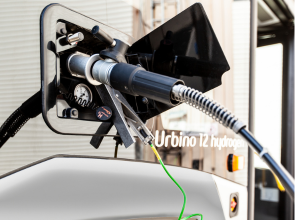Hyundai Motor to switch commercial vehicle models to fuel cells by 2028
Hyundai plans to promote hydrogen by 2040 by introducing new technologies and mobility solutions in transportation and other industrial sectors.

Hyundai Motor Group has unveiled its vision for hydrogen energy and a global hydrogen society at the Hydrogen Wave global online forum.
It plans to make all its new commercial vehicles electric, using fuel cell electric or battery-electric powertrains and applying fuel cell systems to all models by 2028.
The automaker main aim is to fully apply its commercial vehicle lineup with fuel cells by 2028.
Chung Mong-koo, Hyundai Chairman, said, “Hyundai Motor Group’s vision is to apply hydrogen energy in all areas of life and industry such as our homes, workplaces and factories. The goal is to make hydrogen readily used for everyone, everything, and everywhere.”
He further added, “We want to offer practical solutions for the sustainable development of humanity and with these breakthroughs, we aim to help foster a worldwide Hydrogen Society by 2040.”
Following the Hydrogen Wave forum, Hyundai to showcase its newly introduced applications and concepts during HydroVILLE exhibition.
It developed its first FCEV in 1998; introduced the Tucson FCEV (ix35 Fuel Cell) in 2013; launched fuel-cell SUV, NEXO in 2018; and the world’s first heavy-duty fuel cell truck, XCIENT Fuel Cell in 2020.
Hyundai expects that by 2040 hydrogen energy will go beyond transportation and will be applied to wider industries and sectors. Hyundai will also expand the scope of fuel cell systems and technologies to all areas of the energy sector, including providing electricity and heating to buildings, urban energy sources and power plants.
By 2028, the company expects to become the first global automaker to apply its fuel cell system to all commercial vehicle models such as buses and heavy-duty trucks for the global market as fuel cell electric vehicles and battery electric vehicles
The Group has already started mass-producing a greatly improved version of the current XCIENT Fuel Cell, the world’s first mass-produced fuel cell heavy-duty truck. It is also developing a tractor based on the XCIENT Fuel Cell that will be released in 2023.
It will develop a 5- 7-meter fuel cell PBV (Purpose Built Vehicle) to target the global light commercial vehicle market projected for 7 million unit sales per year by 2030.
Besides commercial vehicles, it will also apply fuel cell technology to urban air mobility, robots, aircraft and large ships.
It will also aim to achieve a fuel cell vehicle price point comparable to a battery-electric vehicle by 2030.
The company also confirmed that its third-generation fuel cell stack is under development which will succeed NEXO’s current stack. It showcased two power versions of the third-generation fuel cell stack, 100kW and 200kW with reduced size and increased power output, respectively.
The third-generation system can also be applied in various application forms. A new ‘Power Unit Module’ can provide a range of outputs from 500kW to 1MW by stacking 100kW modular units, can be used in emergency power system for large ships or IT companies.
The Trailer Drone concept is a hydrogen-powered container transportation system capable of operating fully autonomously. The Trailer Drone concept requires two fuel cell e-Bogies, allowing for unprecedented manoeuvrability through sideways movement. The Trailer Drone can move autonomously through portside operations and tight urban environments.
